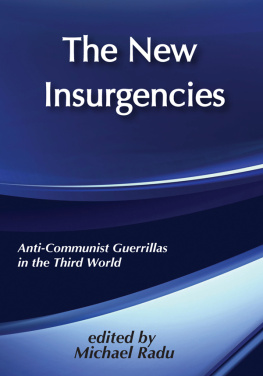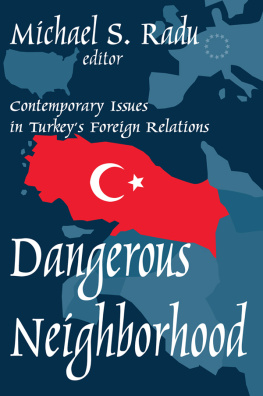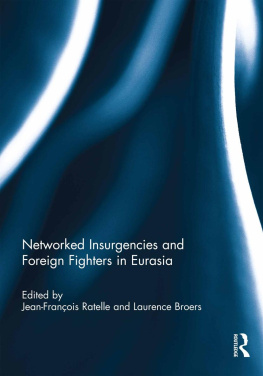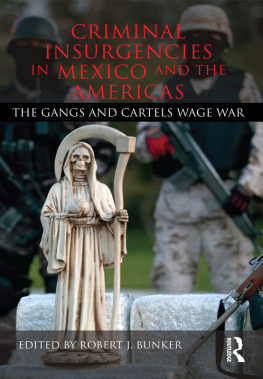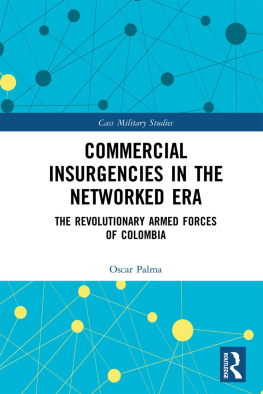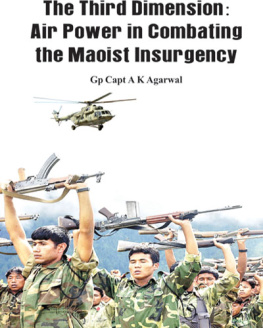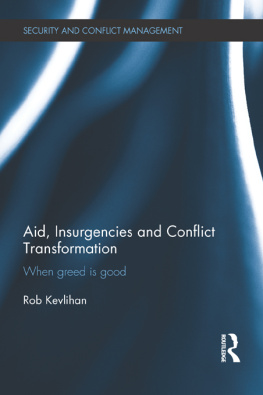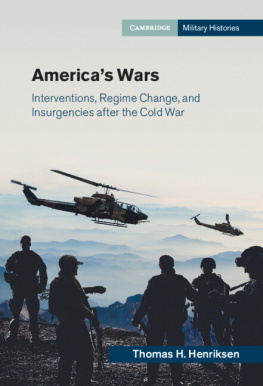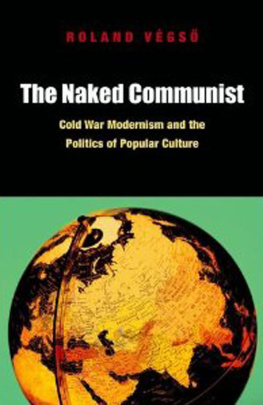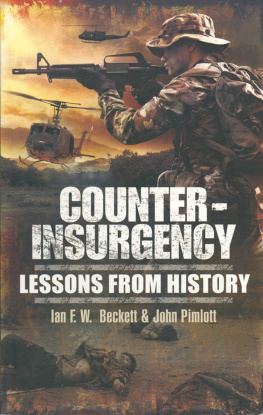First published 1990 by Transaction Publishers
Published 2017 by Routledge
2 Park Square, Milton Park, Abingdon, Oxon OX14 4RN
711 Third Avenue, New York, NY 10017, USA
Routledge is an imprint of the Taylor & Francis Group, an informa business
Copyright 1990 by Michael Radu
All rights reserved. No part of this book may be reprinted or reproduced or utilised in any form or by any electronic, mechanical, or other means, now known or hereafter invented, including photocopying and recording, or in any information storage or retrieval system, without permission in writing from the publishers.
Notice:
Product or corporate names may be trademarks or registered trademarks, and are used only for identification and explanation without intent to infringe.
Library of Congress Catalog Number: 89-35249
Library of Congress Cataloging-in-Publication Data
The New insurgencies: anti-communist guerrillas in the Third World / [edited by] Michael Radu; with contributions by Anthony Arnold ... [et al.].
p.cm.
A Foreign Policy Research Institute book - Prelim. p.
Includes bibliographical references.
ISBN 0-88738-307-6
1. Anti-communist movements Developing countries. 2. Guerrillas Developing countries History 20th century. 3. Developing countries Politics and government. I. Radu, Michael. II. Arnold, Anthony.
| D883.N49 1989 |
| 303.64-dc20 | 89-35249
CIP |
ISBN 13: 978-0-88738-307-6 (hbk)
Michael Radu
The Nature of the Phenomenon
The Century of the Guerrilla
Irregular warfare has become the dominant form of war. Unlike conventional wars of this and past centuries, which generally had clear starting and ending points, guerrilla wars seldom begin or end on a specific date. Insurgencies continue for many years, even when the chances of victory are remote or nonexistent. In fact, the very meaning of victory in such wars is drastically different from victory in conventional conflicts: for the governments under attack by insurgents, victory often means the containment rather than the eradication of the guerrillas.
Thus, the British won the Malaya campaign of the 1950s when the Communist party of Malaya (CPM) ceased operating in large areas of the peninsula; Communist guerrillas, however, still operate sporadically in peninsular Malaysia today, almost two decades after the end of the conflict. The case of the Omani, British, and Iranian victory over the Dhofar insurgents was far more clearcut, but peculiar circumstances and an unusual terrain played a unique role in that conflict.1 In Colombia, where the first Communist insurgency started sometime in the late 1950s, the government still faces a continuing challenge from a number of Marxist-Leninist guerrilla groups. None of these groups has ever threatened the existence of the Colombian government, but the government has not been able to eradicate them and completely pacify the countryside, either. This pattern of an insurgency never deadly but never quite dead has plagued the governments of Burma since the 1950s, Guatemala since 1962, Thailand since the 1950s, South Africa (in Namibia and to some extent at home) and Ethiopia since the 1960s, and Nicaragua since 1961.
The Philippines is still the only place in which US military advice and force can claim a decisive share in a victory over a Communist insurgency, over the Huks of the 1950s and early 1960s. However, the first supreme commander of the new and still highly successful New Peoples Army (NPA), Bernab Buscayno (Commander Dante), now a legitimate politician, was once a Huk leader.2
There are more examples of such indecisive campaigns: Cambodia, Morocco, Chad, Angola, and Mozambique all are countries experiencing more than fifteen years of internal irregular warfare. Insurgencies in El Salvador, Peru, Uganda, Indonesia, Afghanistan, and other countries are at least ten years old. It has become increasingly clear that the twentieth century, which invented the concept of total war, has also seen permanent internal war develop into a universal phenomenon. Indeed, a growing number of countries, almost all in the Third World, have by now experienced a state of internal war for at least a generation. Cases on three continents, including Colombia, Uganda, the Philippines, Israel, South Africa, Namibia, and Angola, confirm both the geographic and cultural scope of the phenomenon. Finally, in political and legal terms, although the permanent wars phenomenon is a highly unorthodox form of conflict in that none of them has resulted in a formal declaration of war, the concept itself seems to be at least selectively accepted as legitimate by such international sources of public opinion as the International Court of Justice and, particularly, the General Assembly of the United Nations. The implication is that guerrilla wars are acceptable, even legitimate, as long as they have a degree of moral acceptance; the problem is that the criteria of acceptance and ultimately the moral values justifying them are decided by governments whose values and political mores have little in common with those of the West.
In contemporary global political discourse, Japan, New Zealand, Australia, Israel, Western Europe, the United States, and Canada (and sometimes even South Africa, Taiwan, Singapore, and Hong Kong), are all considered Western. The implicit distinction is between such advanced and essentially politically tolerant countries and the overwhelming majority of states. However, neither language nor political tradition justifies lumping together such diverse countries.
Dismissing the UN or world opinion as misguided or irrelevant, a constant temptation for Western conservatives, raises more questions than it answers, however, especially at a time when a strong Western stance supporting democracy and morality, and the will to enforce it, are increasingly lacking.
The persistence of terrorism, which in itself could be seen as a form of irregular warfare and is always part of guerrilla wars, complicates the picture even further.3 Terrorism is not simply an adjunct of insurgency; it often takes on a life of its own and becomes a goal rather than a means, especially when used in democratic or relatively democratic countries. Terrorism for its own sake has sporadically plagued the United States (mostly, but not exclusively in regard to Puerto Rico), France, the United Kingdom, West Germany, the Netherlands, and Italy for at least the past fifteen years. However, outside Western Europe, the United States, South Africa, and the Southern Cone of South America, terrorism has seldom flourished for long. In other words, it is primarily in heavily urbanized, industrialized, and most often democratic countries that terrorism, as represented by Action Directe in France, the Red Army Faction in West Germany, the Communist Combatant Cells in Belgium, or the SLA and Weathermen in the United States, has played the most significant role.

